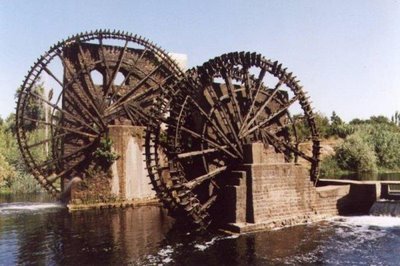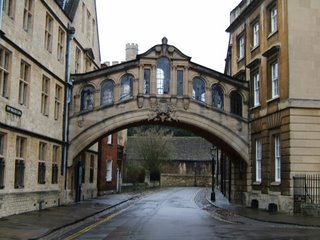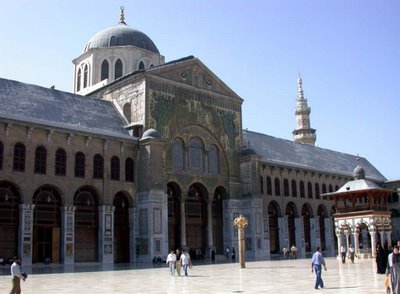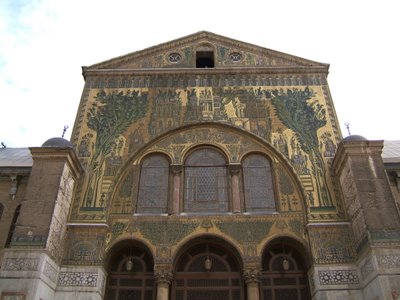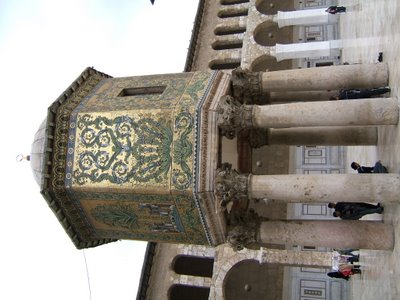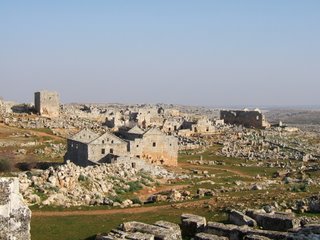Friday, December 22, 2006
Groan
Last night I had a end-of-year dinner with some friends. In between the food, drink and speeches, there was time to open a few Christmas crackers and groan at the jokes. Here are some of the gems
Q: What is big, hairy and flies?
A: King Concorde
Q: How do you make an apple puff?
A: Chase it round the garden a few times
Q: Why did the apple turn over?
A: Because it saw the jam roll
Q: Which athlete is warmest in winter?
A: The long jumper
Q: What did the fish say when it ran into a wall?
A: Dam
and finally...
Q: Why won't we have calenders in the future?
A: Because their days are numbered
Monday, December 11, 2006
My wheels
 My bike was in need of a bit of maintenance this morning, so getting up a bit early, I set about pumping up the tyres, checking the brakes and readjusting the seat. The whole process took only a few minutes, but reminded me of the first time I tried to do some upkeep on my wheels, when I did something quite spectacularly stupid. No laughing or rude comments, please (unless they are behind my back)...
My bike was in need of a bit of maintenance this morning, so getting up a bit early, I set about pumping up the tyres, checking the brakes and readjusting the seat. The whole process took only a few minutes, but reminded me of the first time I tried to do some upkeep on my wheels, when I did something quite spectacularly stupid. No laughing or rude comments, please (unless they are behind my back)...I was ten years old and had recently got my first bike. I’d spent the whole summer
It was only two days later and once I’d soiled four more pairs of trousers that I decided to ask for some advice, and realised the error of my ways. It took me two hours of fun with soap and water before I finally managed to remove all the grease on the chain, and I ended up spending the next six months walking around with conspicuous grease stains on all my jeans.
Tuesday, December 05, 2006
(Biscuit) breaking news
The researchers hope that their work will help biscuit manufacturers alter their cooling processes so that perfect biscuits are produced evey time.
So now you know!
Wednesday, November 22, 2006
Sunday, September 03, 2006
Brazil 3-0 Argentina, five pitch invasions and a Kaká wonder goal
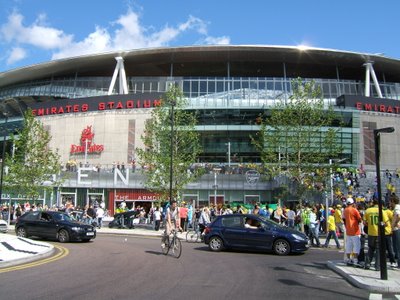
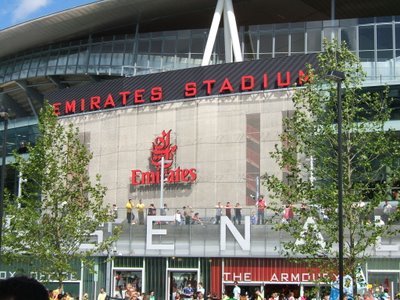
I got to the stadium two hours before kick-off and already the atmosphere was very different to a club game. There was far more of a carnival feeling, with a sea of yellow shirted Brazil fans talking and singing loudly and exchanging lots of friendly banter with the much smaller group of Argentina supporters. The fans were not segregated which, despite the teams’ rivalries, made it seem more like a match between friends.

When the teams were announced and the national anthems started playing the banter stopped temporarily, but Brazil dominated the early exchanges and when they scored the first goal there were loud celebrations and exuberant dancing all round. Midway through the second half, with Brazil two-nil up and in control, a supporter draped in a national flag decided to liven up proceedings by running on to the pitch. He went to hug one of the players, and what followed was a comedy chase round the ground as he tried to evade the guards. He was quite agile, and the crowd cheered every time he managed to escape from the pursuants. Seeing the guards preoccupied, another fella decided to join the first on the pitch, which caused even more chaos. Play resumed a few minutes later, but at the next stop another two fans tried their luck, and in total there were five pitch invasions. When one of them was wrestled to the ground I thought he might need first aid, but he wasn’t hurt and we had little to do throughout the match.

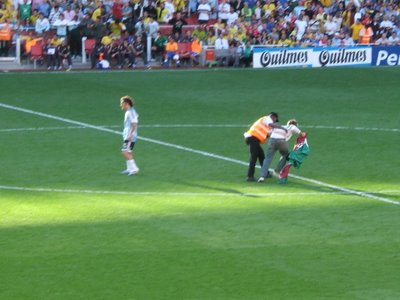

By that time the crowd were becoming restless, but that was all forgotten when Kaká scored a wonder goal. Running the length of the pitch, he escaped from three defenders before slotting in a shot past the keeper. What a goal.
All in all, a fun day.
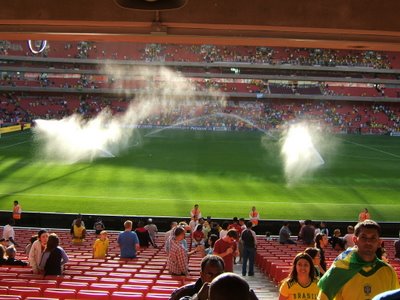
Friday, July 07, 2006
Weakling
Friday, June 23, 2006
Wednesday, June 21, 2006
Linux woes
The server on which all my data is stored is being rebooted, but it’s taking way way longer than anticipated, so I haven’t been able to run any scripts for the past two days. Meanwhile, my supervisor is attending a course in Italy and wanted to show my data to a researcher over there. She keeps emailing me asking for data but I can’t do anything till the server is back online.
Feel completely paralysed at the moment.
Friday, June 16, 2006
World Cup Stories
"As part of coach Juergen Klinsmann's new-age methods, the German team watched a 10-minute film on the culture of Costa Rica before their opener against the Central Americans. The duration of the film was recommended by the team psychologist who noted that the men under his charge had an attention span of exactly 10 minutes for most things beyond their normal areas of interest."
"The civic authorities who ran extra tram services in Gelsenkirchen to get fans in and out of its World Cup stadium quickly discovered that some fans didn't want to get off - namely the Ecuadoreans, who came to town for the match against Poland and had never travelled in trams before."
"Spain's El Pais newspaper called the England team "flat, grotesque and contaminating" and its striker Peter Crouch a "two-metre asparagus"."
"Even the turf is official: only two varieties of grass are prescribed and allowed to be grown as football turf in World Cup stadia: the lolium perenne (rye/perennial grass) and poa pratensis (blue grass/Kentucky grass)."
"The Ghanian camp includes the mother of one of the players whose express purpose for being in Germany is to cook her son's favourite dish of rice and groundnuts."
Friday, June 09, 2006
World Cup Predictions
With the tournament kick-off only minutes away, I thought I'd share my predictions for the competition. That way you can chastise me when I get it horribly wrong.
Winners: Netherlands
Golden boot: Fernando Torres (Spain)
What do you reckon?
Next week sees the climax of the Dauphine Libere, an important warm up for the Tour de France. My tip for that was Floyd Landis, but he's still outside the top ten. For the Tour itself, Ivan Basso looks mighty but I'm hoping Jan Ullrich shows just how good he can be.
Talking of cycling, I had a bad an expensive problem on Wednesday. I have cantilever brakes, and cycling back from College my rear brake cable snapped. My supervisor (a bit of a bike expert) recommended I get a new cable professionally fitted, but Halfords have quoted £70 (£4 parts, the rest labour) to do so. Ouch!
Thursday, May 25, 2006
Thursday, May 11, 2006
Research hero
Sunday, April 23, 2006
What is MUN?!
Some of you have been asking what MUN actually is. Sorry I didn’t explain it earlier.
The following was taken from the Model United Nations websites of the International University Bremen, Queen’s University Belfast and the Interscholastic Association of Southeast Asian Schools (IASAS). The IASAS website in particular has much more information about the qualities required to be a good MUNer.
"The concept of a Model United Nations was developed by students in America after World War II in order to simulate the challenges of diplomacy and international negotiation. These model conferences particularly focus on areas of peace and conflict resolution that are a part of the day-to-day work of the United Nations. During a MUN conference participants are assigned to delegations representing a specific country – never their real home country though. These delegations represent the positions of their countries in the General Assembly, Security Council and the respective committees. The debates are held in English, and the student diplomats strictly have to observe all rules of the United Nations protocol."
"Before playing out their ambassadorial roles, students research global problems to be addressed, drawn from today's headlines. Members learn how the international community acts on its concerns about topics including peace and security, human rights, the environment, food and hunger, economic development, and globalization. Model U.N. delegates also look closely at the needs, aspirations, and foreign policy of the countries they will represent at the event."
Friday, April 14, 2006
Weird
Thanks to Statcounter for this info.
Wednesday, April 12, 2006
Spectroscopy volunteers
Saturday, March 25, 2006
That's not you!
Thursday, March 23, 2006
Density times volume times g equals...
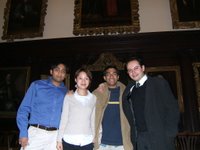 This might seem like a bit of a random post, given that it's so long since I regularly updated the blog. Sorry about that.
This might seem like a bit of a random post, given that it's so long since I regularly updated the blog. Sorry about that.So, this week I've been in Oxford on a Medical Image and Signal Analysis Spring School for PhD students. And boy is it intense. Probably the most intense academic experience I've had, given that the lectures are geared towards engineers and physicists and included slide upon slide of challenging maths. Anyway, this evening was the formal dinner, and we were in frivolous mood. During one of the unusual conversations, someone asked my lab mate how much she thought that he weighed. She considered for a second, looked confused and replied with the classic quote
"How can I guess how much you weigh when I don't know your density!"
Spoken like a true physicist.
P.S. How much do you think I weigh?
Wednesday, March 22, 2006
Tuesday, March 21, 2006
Sunday, March 19, 2006
Oxford Spring School
Whilst we were waiting in Marble Arch for the coach to Oxford, we were passed by London’s largest Arba’een (Chelum) procession of Iman Hussain. Chelum is commemorated forty days after Ashura, and remembers the martyrdom of the Prophet’s grandson. Iman Hussain, along with over seventy of his supporters, was killed in the Battle of Karbala in 680AD (61AH)

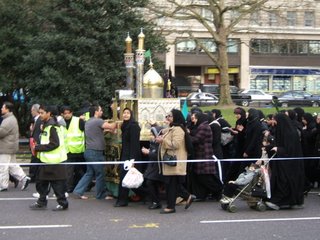
Saturday, March 18, 2006
LINKS committee training weekend
The venue

The view

The games (Polar bear!)

The team

Thursday, March 16, 2006
New CPR protocols
Wednesday, March 15, 2006
WorldMUN position paper II
Committee: UN High Commissioner for Refugees
Topic: Unaccompanied Minors
Country: Nigeria
Delegate: Moc, Imperial College London, UK
Nigeria has ratified both the UN Convention on the Rights of the Child and the 1951 Convention Relating to the Status of Refugees and embodies the principles outlined in these. Being acquainted with the unique and extremely difficult problem faced by thousands of accompanied minors, Nigeria welcomes initiatives to nurture and protect the full entitlement of human rights and liberties of this vulnerable group. In a part of the world where mass migration for political, cultural, economic or social reasons is becoming increasingly common, Nigeria recognises that unaccompanied minors are often the subjects of abuse, neglect and human trafficking, and are sometimes unwilling combatants in armed conflict, and in partnership with the United Nations Human Rights Council (UNHRC) has taken steps in line with to ensure this does not happen within its borders. With funding from the UNHCR’s Regional Support Hub in Accra, Nigeria has been able to strengthen its “protection capacity” and “pursue durable solutions for both camp-based and urban refugees”. By doing so, Nigeria has been able to afford assistance and shelter to refugees from Liberia, Sierra Leone, the Democratic Republic of Congo, Chad and Sudan.
Unaccompanied minors from Nigeria are also victims in other countries, and Nigeria recognises that minors are used as “anchors” to obtain asylum in other countries of refuge, where they are often subject to exploitation. One of the major reasons for this is the frequent lack of any documentation in refugee situations, which is exacerbated by minors often finding themselves in new surroundings where they do not understand the language, culture or bureaucracy of their country of refuge and may not be aware of their rights under the Convention on the Rights of the Child. These minors often require especial care and support, and Nigeria feels that the mandate of the UNHCR requires this body to provide all the support necessary for member states to provide for this vulnerable group.
The burden of care for unaccompanied minors mainly lies with developing countries, in particular those in Africa and Asia, and Nigeria feels that the successful programs already being implemented by the UNHCR all over the world could be specially tailored to the needs of unaccompanied minors in these regions. In particular, Nigeria feels that extra funding to countries of refuge to help with education, vocational training, income-generating activities, repatriation (where appropriate) and asylum processes are critical so that these often marginalised children can have their material and psychosocial needs met. Nigeria is very pleased that this issue is being discussed by the UNHCR and welcomes efforts from all member states concerned with this issue to help provide for all unaccompanied minors.
1. http://www.unhcr.org/cgi-bin/texis/vtx/publ/opendoc.pdf?tbl=PUBL&id=4371d19ea
2. http://en.wikipedia.org/wiki/Convention_on_the_Rights_of_the_Child
Tuesday, March 14, 2006
Duped
Sunday, March 12, 2006
St Patrick's Day Food Fair
No one to treat today. Whilst we were on foot patrol one little girl went to the the first aid station for some treatment for a sore head, but other than that a plaster (band-aid) was the only thing we gave out. Was nice to see some friends before the imminent exam season though. It's gonna be tough.

Covent Garden

Saturday, March 11, 2006
WorldMUN position paper I
Committee: UN High Commissioner for Refugees
Topic: Rwandan Refugees in Burundi
Country: Nigeria
Delegate: Moc, Imperial College London, UK
As a signatory of both the 1951 Convention Relating to the Status of Refugees and the 1969 Convention Concerning the Specific Aspects of Refugee Problems in Africa. Nigeria watched in horror as events unfolded in Rwanda in 1994. Hundreds of thousands of people were killed and even more were forced to flee their homes fearing persecution as violence broke out between Hutus and Tutsis. However since the return of relative stability to the region many have returned to Rwanda and have, with the assistance of governments throughout Africa’s Great Lakes region, begun rebuilding their lives.
In the aftermath of the violence, an independent report on the United Nations’ role in the conflict cited the UN peacekeeping mission’s “lack of resources” and stated that “Rwandans in need of protection had been abandoned”. Since then, attempts to hold those accountable for the atrocities have been initiated by the Rwandan government, whilst the international community has made its efforts in the form of the International Criminal Tribunal for Rwanda (ICTR). In addition, Gacaca tribunals, dispensing community justice, have been established officially within Rwanda to punish perpetrators of the violence. However, fearing punishment for their actions or retaliation for the actions of others, since April 2005 approximately 10000 Hutus have fled Rwanda for neighbouring Burundi.
Both Rwanda and Burundi are obliged under the 1951 Convention Relating to the Status of Refugees and the 1969 Convention Concerning the Specific Aspects of Refugee Problems in Africa to prohibit the return of persons to territories where they could be at risk of serious human rights abuse. That said, both governments have stated that repatriation of refugees is their common goal, and the Rwandan government has publicly assured all Rwandan refugees of their safety and right to a fair trial. Nigeria has the utmost confidence in the two states to uphold their obligations and fulfil their promises. Nigeria welcomes the steps being made towards peaceful democracies in the region and is convinced that recent dialogue between the two states will further this process. Many in Rwanda are still haunted by the hostility that has erupted since ethnic divisions were first encouraged in the region, and Nigeria feels that the proposed goals of fair trials for those involved as well as the paramount protection for all those that are innocent is the best way forward. On this note, and given the mistrust many Rwandans feel towards UN peacekeepers and the International Criminal Tribunal for Rwanda (ICTR), Nigeria believes the United Nations High Commissioner for Refugees (UNHCR) should primarily play the crucial role of providing refugees with humanitarian assistance. Many Rwandan refugees are currently living in overcrowded, disease ridden camps, and Nigeria is sensitive to the fact that Burundi faces understandable difficulties in providing for these people given its current economic situation. By partially alleviating this burden the UNHCR would build many bridges with all peoples and contribute to a more stable future for all nations in the region. However, Nigeria believes that a local approach, under the auspices of the African Union and relevant UN bodies, would be the best approach in resolving the political and social problems of Rwanda and Burundi.
Nigeria is a friend of all peace loving nations and all member states working to ensure security and stability in the region. Like many African nations, however, Nigeria hosts significant numbers of refugees, and is convinced that the only way to achieve long-term stability is through regional dialogue and leadership.
1. http://www.brad.ac.uk/acad/confres/monitor/mntr6_africa2.html
Thursday, March 09, 2006
Recurrent miscarriage
I found more good information on the condition on the website of the St Mary’s NHS Trust’s Recurrent Miscarriage Clinic, where Prof Regan works.
Monday, March 06, 2006
Friday, February 24, 2006
Annual general meeting
Thursday, February 23, 2006
Lab winner
Wednesday, February 22, 2006
China and WorldMUN beckon
In the mean time, though, I have to do some serious preparation. I know next to nothing about the country I’m representing (Nigeria), let alone the topics we’ll be discussing (Rwandan refugees in Burundi and Unaccompanied minors). Position papers are due soon so I’d better get to work. Help!
Sunday, February 19, 2006
Resolution passed
I’m glad I signed up for LIMUN in the end. The debates were really stimulating and dynamic and we had the chance to meet people from all over the world. Would definitely do it again.
Saturday, February 18, 2006
LIMUN
London International Model United Nations (LIMUN) is the biggest annual university-based MUN conference in the UK, and this year it’s being held at Imperial. I’m representing Turkey in the Social, Humanitarian and Cultural committee, a specialised subset of the UN General Assembly. We’re debating female circumcision, or ‘cutting’, and things are already pretty heated. I didn’t have time to extensively prepare for the conference, but as far as I know female circumcision isn’t practiced in Turkey and it doesn’t seem to be a topic that it’s government has strong views on. So I’m not that active in discussions, but it’s interesting to note that, amongst others, the delegates representing Kenya and Egypt are totally against a resolution urging member states to impose a ban, even though their governments have already enacted bans (I really should have done more research as to their extent).
Anyway, committee is over for the day, and the social event beckons: a boat party on the Thames.
Wednesday, February 15, 2006
A promise (and apologies)
Till tomorrow,
Moc
Saturday, February 11, 2006
Hyde Park Relays
Wednesday, February 08, 2006
Welfare officer
Sunday, February 05, 2006
International Night
Opening ceremony

Malaysian Society

Hellenic Society (I think)

No idea

Iranian Society

Japanese Society...it's Doraemon!

Arabic Society

Blur

Saturday, January 14, 2006
Travel tips
Anyway, it’s all over now. I’d like to share some of the lessons we’ve learnt from the trip. Most of it is common sense, but pretty easy to overlook:
- Always keep photocopies of all your important travel documents (passport, flight ticket, etc.). This saved us even more hassle. Another good tip that a friend gave me is to scan your documents and email them to yourself. That way you can easily send them on or make extra copies as required.
- Be contactable. Try and keep a local mobile phone number, the phone number of the place you’re staying as well as that of a friend. Also, note down the contact details of your national embassy in the country you are visiting.
- In case of emergency, have some back home who can transfer money to you or help you in any other way.
- Even if you’re travelling in a group and one person is carrying most of the money, give each person at least enough cash to get back to where you’re staying.
- If you’re planning on taking travellers’ cheques with you, make sure that wherever you’re heading they can be easily replaced in case they are lost/stolen (it’s best to ask the company issuing the TCs directly). Write down the cheque numbers and keep this paper in a safe place.
- Plan a rough itinerary, so you at least have an idea of where you can stay and what to visit in each of the places you’re going to visit. It’s easy to do this with the help of a guidebook.
- Whilst you’re looking in the guidebook, check the climate and pack appropriately. I didn’t and froze in Damascus.
- If you’re a student, take an ISIC card with you.
- Take some basic meds with you, just in case you fall ill (diarrhoeal meds, throat lozenges, anti-histamines and anything else appropriate to your destination).
- Don’t underestimate the kindness and helpfulness of strangers. If you’re not dealing with someone whose livelihood depends on tourism or you’re not in a solely touristic city, it’s usually safe to trust people. And if you’re ever lost, ask a local for help!
Monday, January 09, 2006
Sunday, January 08, 2006
Aleppo's Citadel
The massive and imposing Citadel dominates Aleppo, rising 50m above street (and souk) level. Surrounded by a moat and steep sided (48 degree) sides, it was almost inconquerable, and the extensive renovations being carried out makes the inside similarly impressive. In fact, I think it's the most awe-inspiring building I've seen here so far.
A street level view of the Citadel. Fancy breeching that.
The monumental gateway
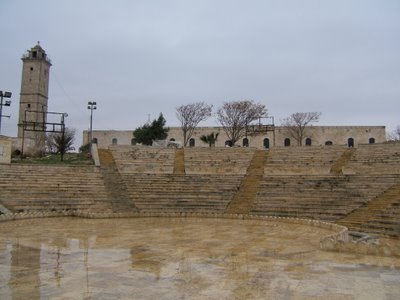
The amphitheatre (it's modern, built in the 1970s)
 The roof of the incredible throne room
The roof of the incredible throne room
Saturday, January 07, 2006
Aleppo in pictures
National Museum entrance

Old town souk

New friends

Colourful lighting

Turkish bath

St Simeon (Qalat Samaan)
“The beautiful fifth-century church of St Simeon represents the largest and most important surviving Christian monument of the early Byzantine period…
"St Simeon Stylites was born in 386AD, the son of a Cilician farmer… In 412 he joined the recently established monastic community of Deir Samaan… Increasingly drawn to a life of asceticism, he gained permission to withdraw from the main community and lead a life of solitude and meditation on the hill where the Church of St Simeon now stands. He soon gained a reputation for his extreme piety and began to attract large numbers of pilgrims from far and wide. Wishing to maintain his detachment in the face of so much attention, he had a 3m tall pillar constructed with a platform on top. From then onwards, until his death forty-two years later, he lived on top of a pillar, or in fact a series of pillars, each taller than the one before, culminating in one between 17-20m high… From his vantage point he preached to the pilgrims who continued to arrive in ever increasing numbers, gave advice on their problems and mediated disputes. According to one of his contemporaries, Bishop Theodoret of Cyrrhus, his fame was such that pilgrims came from as far away as France, England, Spain and Italy.
"[After his death] work began almost immediately on the Church of St Simeon, which was built around his famous pillar. [The pillar itself has now been] reduced to a worn and insubstantial lump of stone by the countless pilgrims who over the centuries have chipped away pieces to take home as holy relics."


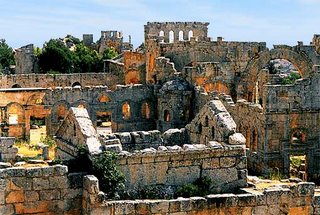
Ain Dara


Norias
